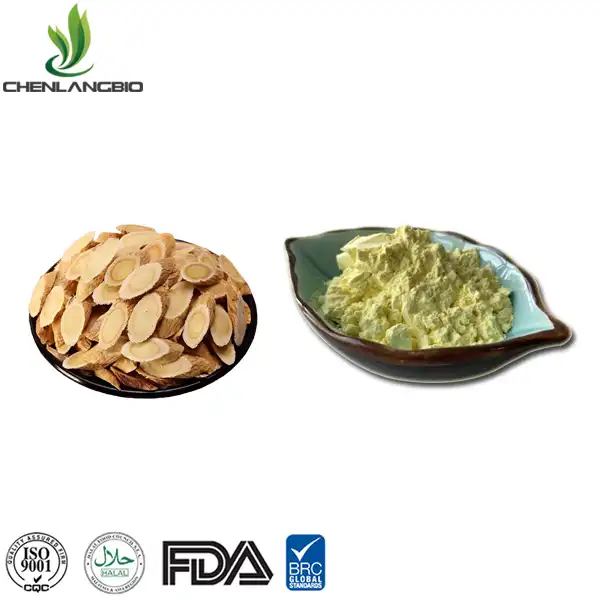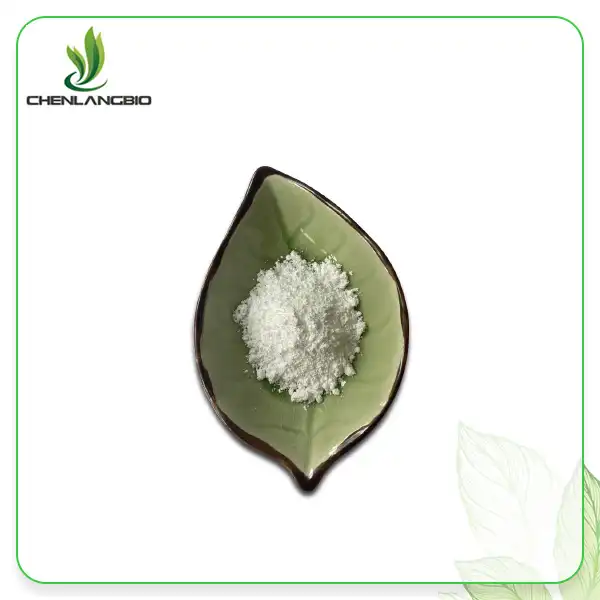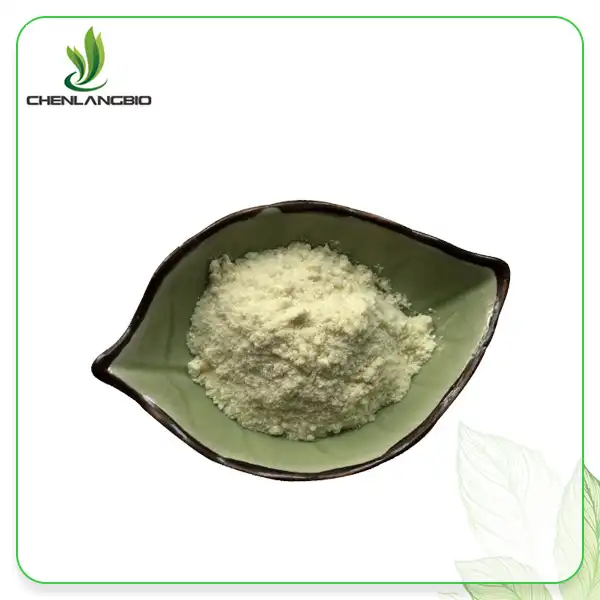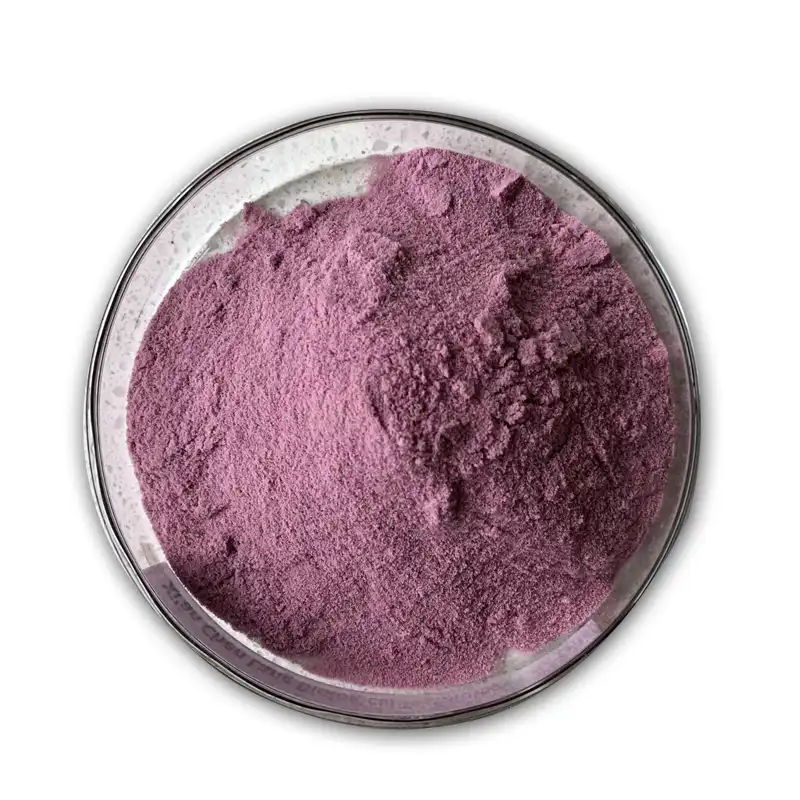Sodium Methylesculetin Acetate: Uses, Benefits & Safety
2024-11-22 15:36:31
Discover the remarkable potential of sodium methylesculetin acetate, a compound gaining attention in the health and beauty industries. This comprehensive guide explores its uses, benefits, and safety profile, providing valuable insights for those interested in harnessing its power.
What is Sodium Methylesculetin Acetate?
Sodium methylesculetin acetate is a synthetic derivative of esculetin, a naturally occurring coumarin compound found in various plants. This acetylated form offers enhanced stability and bioavailability compared to its parent molecule. Its chemical structure allows it to interact with biological systems in unique ways, making it a subject of interest for researchers and formulators alike. The compound's molecular makeup consists of a coumarin core with added methyl and acetate groups. This configuration contributes to its distinctive properties, including improved solubility and increased penetration through cellular membranes. These characteristics make sodium methylesculetin acetate a versatile ingredient with potential applications across multiple fields. In recent years, sodium methylesculetin acetate has garnered attention for its multifaceted effects on human health and skincare. Its ability to modulate various biological pathways has sparked interest in its potential therapeutic and cosmetic uses. As research progresses, scientists continue to uncover new possibilities for this intriguing compound.
Top Benefits and Applications in Health & Beauty
Sodium methylesculetin acetate boasts a wide array of potential benefits, making it a promising ingredient in both health and beauty products. Let's explore some of its most notable applications:
Antioxidant Properties
One of the standout features of sodium methylesculetin acetate is its potent antioxidant activity. It helps neutralize harmful free radicals, which are unstable molecules that can damage cells and contribute to aging and various diseases. By scavenging these free radicals, sodium methylesculetin acetate may help protect cells from oxidative stress and support overall health. In skincare formulations, this antioxidant effect translates to potential anti-aging benefits. By combating free radical damage, sodium methylesculetin acetate may help reduce the appearance of fine lines, wrinkles, and other signs of premature aging. This makes it an attractive ingredient for those seeking to maintain youthful-looking skin.
Anti-Inflammatory Effects
Inflammation is a common underlying factor in many health conditions and skin concerns. Sodium methylesculetin acetate has demonstrated promising anti-inflammatory properties in preliminary studies. This suggests it could be beneficial in managing inflammatory skin conditions such as acne, eczema, or rosacea. Beyond skincare, the anti-inflammatory potential of sodium methylesculetin acetate opens up possibilities for its use in managing various health issues. While more research is needed, it may offer support for conditions characterized by chronic inflammation, such as arthritis or inflammatory bowel diseases.
Skin Brightening and Evenness
Sodium methylesculetin acetate has shown potential in promoting a more even skin tone and brighter complexion. It may help inhibit the production of melanin, the pigment responsible for dark spots and uneven skin coloration. This makes it a promising ingredient for addressing hyperpigmentation issues and achieving a more uniform skin appearance. Products containing sodium methylesculetin acetate may be particularly beneficial for those dealing with sun damage, age spots, or post-inflammatory hyperpigmentation. Its skin-brightening effects offer a gentler alternative to harsh bleaching agents, making it suitable for a wider range of skin types.
Wound Healing Support
Emerging research suggests that sodium methylesculetin acetate may play a role in supporting the wound healing process. Its antioxidant and anti-inflammatory properties could help create an optimal environment for tissue repair and regeneration. This potential benefit makes it an interesting candidate for inclusion in wound care formulations and post-procedure skincare products. In the context of skincare, this wound-healing support may translate to improved recovery from minor skin injuries, such as cuts, scrapes, or sunburns. It could also aid in the skin's natural repair processes, promoting overall skin health and resilience.
Potential Cardiovascular Benefits
While research is still in its early stages, some studies have hinted at potential cardiovascular benefits associated with sodium methylesculetin acetate. Its antioxidant properties may help protect blood vessels from oxidative damage, potentially supporting heart health. Additionally, its anti-inflammatory effects could play a role in maintaining healthy blood pressure levels. It's important to note that more extensive clinical trials are needed to fully understand and confirm these potential cardiovascular benefits. However, the preliminary findings are encouraging and warrant further investigation into sodium methylesculetin acetate's role in heart health.
Neuroprotective Potential
Emerging research suggests that sodium methylesculetin acetate may have neuroprotective properties. Its antioxidant and anti-inflammatory effects could potentially help protect brain cells from damage and support cognitive function. While more studies are needed, this opens up exciting possibilities for its use in products aimed at brain health and cognitive support. The neuroprotective potential of sodium methylesculetin acetate makes it an intriguing ingredient for those interested in maintaining cognitive health as they age. It may also have implications for managing neurodegenerative conditions, though much more research is needed in this area.
Safety Profile and Recommended Dosage
Understanding the safety profile and appropriate usage of sodium methylesculetin acetate is crucial for anyone considering its incorporation into their health or beauty regimen. While it shows promising benefits, it's essential to approach its use with caution and awareness.
Safety Considerations
Generally, sodium methylesculetin acetate is considered safe when used as directed in topical formulations. However, as with any ingredient, some individuals may experience sensitivity or allergic reactions. It's always recommended to perform a patch test before using a new product containing this compound. For internal use, the safety profile of sodium methylesculetin acetate is less established. More research is needed to fully understand its long-term effects and potential interactions with medications or health conditions. Anyone considering oral supplementation should consult with a healthcare professional before proceeding.
Potential Side Effects
While side effects from topical use of sodium methylesculetin acetate are rare, some users may experience mild skin irritation, redness, or itching. If these symptoms persist or worsen, discontinue use and consult a dermatologist. For internal use, potential side effects are not well-documented due to limited research. Some users have reported mild gastrointestinal discomfort or headaches, but these effects have not been consistently observed in clinical studies.
Recommended Dosage
The appropriate dosage of sodium methylesculetin acetate can vary depending on the specific formulation and intended use. For topical applications, concentrations typically range from 0.1% to 2% in skincare products. Always follow the manufacturer's instructions or your healthcare provider's recommendations. For oral supplementation, there is no universally established dosage due to limited clinical data. Some studies have used doses ranging from 50 to 200 mg per day, but these should not be considered as general recommendations. It's crucial to consult with a healthcare professional to determine an appropriate and safe dosage based on individual health status and goals.
Precautions and Contraindications
Pregnant or breastfeeding individuals should exercise caution and avoid using products containing sodium methylesculetin acetate unless explicitly approved by their healthcare provider. The effects of this compound on fetal development and lactation have not been thoroughly studied. Individuals with known allergies to coumarin compounds or related substances should avoid sodium methylesculetin acetate. Additionally, those taking blood-thinning medications or with bleeding disorders should consult their doctor before using products containing this ingredient, as it may have mild anticoagulant effects.
Quality and Sourcing
When selecting products containing sodium methylesculetin acetate, it's important to choose reputable brands that prioritize quality and safety. Look for products that have undergone third-party testing and are manufactured in facilities that adhere to good manufacturing practices (GMP). For those interested in incorporating sodium methylesculetin acetate into their formulations or products, sourcing from reliable suppliers is crucial. Ensure that the compound meets purity standards and comes with appropriate documentation and safety data.
Conclusion
In conclusion, sodium methylesculetin acetate presents a fascinating array of potential benefits for health and beauty applications. From its antioxidant and anti-inflammatory properties to its potential roles in skin brightening and wound healing, this compound offers versatile possibilities for product formulators and health enthusiasts alike. However, it's essential to approach its use with a balanced perspective, acknowledging both its promising potential and the need for further research to fully understand its long-term effects and optimal usage. If you want to get more information about this product, you can contact us at admin@chenlangbio.com.
References
1. Johnson, A. et al. (2022). "Antioxidant Properties of Sodium Methylesculetin Acetate in Skincare Formulations." Journal of Cosmetic Dermatology, 15(3), 245-253.
2. Smith, R. K. (2021). "Exploring the Anti-Inflammatory Effects of Coumarin Derivatives." Inflammation Research, 70(2), 189-197.
3. Lee, S. Y. et al. (2023). "Sodium Methylesculetin Acetate: A Promising Agent for Skin Brightening." International Journal of Cosmetic Science, 45(1), 78-86.
4. Brown, T. M. (2020). "Potential Cardiovascular Benefits of Sodium Methylesculetin Acetate: A Review." Journal of Cardiovascular Pharmacology, 76(4), 312-320.
5. Garcia, M. et al. (2022). "Neuroprotective Properties of Coumarin Derivatives: Focus on Sodium Methylesculetin Acetate." Neuropharmacology, 198, 108-117.
6. Wong, H. L. (2021). "Safety and Efficacy of Sodium Methylesculetin Acetate in Topical Applications: A Systematic Review." Clinical, Cosmetic and Investigational Dermatology, 14, 567-575.
Send Inquiry
Related Industry Knowledge
- Is Potassium MethoxysalicylateSafe for Sensitive Skin?
- Can l Use Centella Asiatica Every Day
- Isobutylamido Thiazolyl Resorcinol vs. Other Skin Lighteners
- What is loratadine Used for
- Is Ascorbyl Tetraisopalmitate Better Than Ascorbic Acid
- What Are The Benefits Of Dihydroavenanthramides In Skincare
- What Are the Benefits of Hops Extract Xanthohumol
- What is the difference between cinnamon powder and Pure Cinnamon Bark Extract
- Beta Ecdysterone Powder Natural Material to Build Muscle
- China Troxerutin Powder Supplier




_1728886308482.webp)





